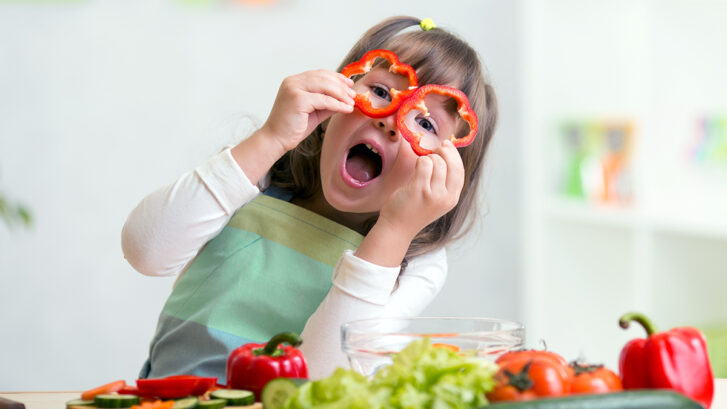Is a Vegan Diet Safe for Kids?
As more and more adults turn to either a vegan or a vegetarian diet for health and/or philosophical reasons, naturally they want to introduce their children to the same way of eating. But controversy has raged for years about how safe such a diet is for growing bodies.
So our concierge doctors in Jupiter thought we’d explore the latest research on whether it’s a good idea to for kids to become vegan.
Advantages of the diet
First, let’s define the terms “vegan” and “vegetarian.” Vegetarians subsist primarily on plant-based foods, but do eat some animal byproducts like yogurt, eggs, and milk products (they are known as “lacto-ovo” vegetarians). Vegans avoid anything at all that comes from animals, including dairy products, eggs, and honey.
This way of eating is not new, even though it’s only gained widespread popularity in America within the last few decades.
Vegetarianism, and the more restrictive veganism, date back to ancient India and Greece. Veganism is also a part of many religions, including Buddhism and the Seventh Day Adventists. The first-known vegan cookbook was published in London in 1849. A 2012 Gallup poll found that five percent of adult Americans are vegetarian and two percent are vegans. A more recent survey puts the current figure closer to 10 percent, illustrating the growing popularity of the diet.
In numerous studies, vegans and vegetarians appear in many ways healthier to be than the population as a whole. According to the Academy of Nutrition and Dietetics, vegetarians have lower cholesterol levels, lower blood pressure, lower overall cancer rates, a lower risk of heart disease, and a lower risk of chronic disease. But it adds that a vegan diet is healthy only if it’s well rounded and carefully planned.
Kids’ nutritional needs
A plant-based diet requires a lot of plants to obtain adequate nutrition. The key is to ensure you receive all the necessary nutrients that you would obtain from a meat-based diet. This includes protein and amino acids, calcium, iodine, iron, zinc, iodine, and vitamins D and B-12.
The controversy surrounding putting children on a vegetarian or vegan diet is due to concerns that they won’t receive enough of the nutrients they need.
Kids have smaller stomachs and higher nutritional needs to support healthy growth and development, so parents need to be sure their nutrient needs are adequately met.
According to Katie Nowacki, RD, a pediatric dietitian at the Cleveland Clinic, while a vegan diet can be as healthy for children as it is for adults, it may need a few modifications.
“You want to make sure your children are getting all the vitamins and nutrients their growing bodies require,” she said.
Making up for shortfalls
While the American Dietetic Association concluded in 2009 that a well-planned vegetarian or vegan diet was safe for everyone, including pregnant and nursing mothers, children, and babies, it added that fortified foods or supplements can “provide useful amounts of important nutrients.”
Although one small 2021 study in Poland cautioned that “restriction of animal-based foods could prevent children from achieving optimal height or bone mineral status and could lead to selected nutritional deficiencies,” most dietitians and other experts believe that shortfalls can be alleviated through careful planning.
“Toddlers need, per kilogram of body weight, more micronutrients compared to adults,” Liisa Korkalo, a lecturer in the Department of Food and Nutrition at the University of Helsinki, told The Washington Post. Korkalo has conducted research on the diets of children, adding that kids “need a nutrient-dense diet.”
This means including enough non-meat sources of nutrients such as vitamin B-12, calcium, iron, vitamin D, and zinc in the diet. It’s also important that they receive enough protein.
“When a child follows a vegetarian or vegan diet,” Korkalo explained, “it is important to ensure adequate protein intake, as protein from plants is not absorbed as easily. Protein is also essential to make sure your child reaches his or her full height potential.”
Safely making the switch
Some parents may not have the time to monitor their children’s’ food intake so carefully, and therefore may want to reconsider putting them on a strict vegan or vegetarian diet. Plant-based diets, with occasional servings of animal products, may therefore be a better choice.
If you do want to change your child over to a vegan or vegetarian diet, the Wexner Medical Center at Ohio State University recommends doing thorough research first. That means consulting with a registered dietitian specializing in vegetarian nutrition to guide you.
The Cleveland Clinic’s Nowacki also recommends keeping a close eye your child’s physical reactions and emotional state for any adverse impacts.
“Some children may have feelings of separation when they eat differently than their peers,” she said. “Also, following a restrictive or highly specialized diet may lead to restrictive eating behaviors later in life.”
Still, with careful research, planning and monitoring, most experts agree that veganism or vegetarianism is safe for kids.

